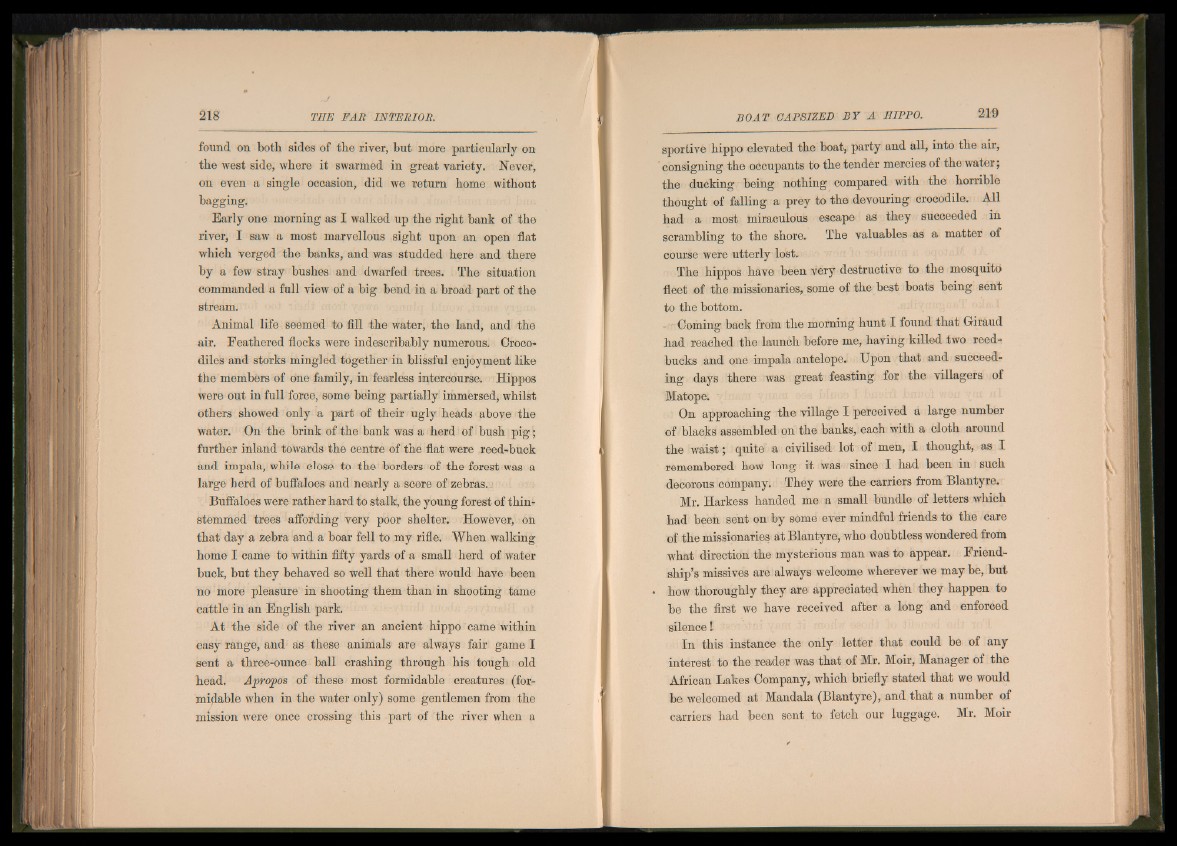
found on both sides of the river, but more particularly on
the west side, where it swarmed in great variety. Never,
on even a single occasion, did we return home without
bagging.
Early one morning as I walked up the right bank of the
river, I saw a most marvellous sight upon an open flat
which verged the banks, and was studded here and there
by a few stray bushes and dwarfed trees. The situation
commanded a full view of a big bend in a broad part of the
stream.
Animal life seemed to fill the water, the land, and the
air. Feathered flocks were indescribably numerous. Crocodiles
and storks mingled together in blissful enjoyment like
the members of one family, in fearless intercourse. Hippos
were out in full force, some being partially immersed, whilst
others showed only a part of their ugly heads above the
water. On the brink of the bank was a herd of bush p ig ;
further inland towards the centre of the flat were reed-buck
and impala, while close to the borders of the forest was a
large herd of buffaloes and nearly a score of zebras. .
Buffaloes were rather hard to stalk, the young forest of thinstemmed
trees affording very poor shelter. However, on
that day a zebra and a boar fell to my rifle. When walking
home I came to within fifty yards of a small herd of water
buck, but they behaved so well that there would have been
no more pleasure in shooting them than in shooting tame
cattle in an English park.
At the side of the river an ancient hippo came within
easy range, and as these animals are always fair game I
sent a three-ounce ball crashing through his tough old
head. Apropos of these most formidable creatures (formidable
when in the water only) some gentlemen from the
mission were once crossing this part of the river when a
sportive hippo elevated the boat, party and all, into the air,
consigning the occupants to the tender mercies of the water;
the ducking being nothing compared with the horrible
thought of falling a prey to the devouring crocodile. All
had a most miraculous escape as they succeeded in
scrambling to the shore. The valuables as a matter of
course were utterly lost.
The hippos have been very destructive to the mosquito
fleet of the missionaries, some of the best boats being sent
to the bottom.
Coming back from the morning hunt I found that Giraud
had reached the launch before me, having killed two reed-
bucks and one impala antelope. Upon that and succeeding
days there was great feasting for the villagers of
Matope.
On approaching the village I perceived a large number
of blacks assembled on the banks, each with a cloth around
the waist; quite a civilised lot of men, I thought, as I
remembered how long it was since I had been in such
decorous company. They were the carriers from Blantyre.
Mr Harkess handed me a small bundle of letters which
had been sent on by some ever mindful friends to the care
of the missionaries at Blantyre, who doubtless wondered from
what direction the mysterious man was to appear. Friendship’s
missives are always welcome wherever we may be, but
• how thoroughly they are appreciated when they happen to
be the first we have received after a long and enforced
silence 1
In this instance the only letter that could be of any
interest to the reader was that of Mr. Moir, Manager of the
African Lakes Company, which briefly stated that we would
be welcomed at Mandala (Blantyre), and that a number of
carriers had been sent to fetch our Luggage. Mr. Moir